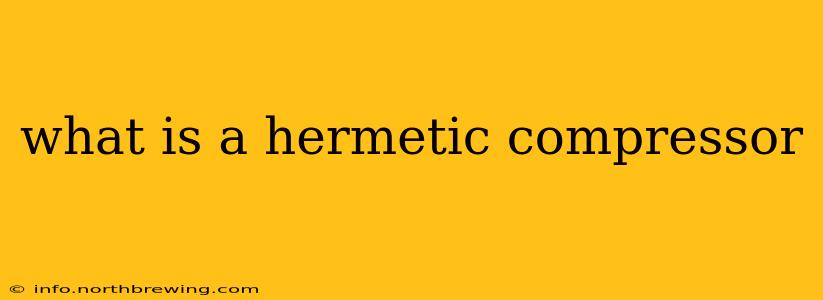A hermetic compressor is a type of compressor where the motor and the compressor are sealed within a single housing, preventing any contact between the refrigerant and the outside environment. This design offers several significant advantages over open compressors, making them a popular choice in various refrigeration and air conditioning systems. Let's delve deeper into the intricacies of this technology.
How Does a Hermetic Compressor Work?
The core principle behind a hermetic compressor lies in its sealed construction. The electric motor and the compressor are enclosed within a hermetically sealed casing, filled with refrigerant. The motor drives the compressor, which compresses the refrigerant gas, raising its temperature and pressure. This high-pressure, high-temperature refrigerant then flows to the condenser, where it releases heat and transitions to a liquid state. This cycle continues, providing cooling or refrigeration. The sealed nature of the unit means there's no external contact with the refrigerant, improving efficiency and safety.
What are the Advantages of Hermetic Compressors?
Hermetic compressors boast several benefits that have contributed to their widespread adoption:
-
Improved Efficiency: The sealed design minimizes refrigerant leaks, resulting in higher energy efficiency. This is because refrigerant loss directly impacts the system's performance, requiring the compressor to work harder to maintain the desired temperature.
-
Enhanced Reliability: With no external moving parts exposed to the environment, hermetic compressors tend to be more reliable and require less maintenance. The sealed unit protects the motor and compressor components from dust, moisture, and other contaminants that could cause premature wear.
-
Reduced Noise Levels: The enclosed design significantly reduces noise pollution compared to open compressors. The sealed casing effectively dampens the sound produced by the motor and compressor operation.
-
Compact Design: Hermetic compressors are generally more compact than their open counterparts, making them ideal for space-constrained applications.
-
Improved Safety: The sealed nature eliminates the risk of refrigerant leaks into the surrounding environment, significantly enhancing safety, particularly with refrigerants that are hazardous to human health or the environment.
What are the Disadvantages of Hermetic Compressors?
While offering numerous advantages, hermetic compressors also have certain drawbacks:
-
Difficult Repair: Should the motor or compressor fail, the entire unit needs replacement. Repairing individual components within the hermetically sealed casing is generally not feasible, leading to higher replacement costs.
-
Limited Serviceability: Regular maintenance is more challenging compared to open compressors. While preventative maintenance is still crucial, diagnosing and addressing issues within the sealed unit can be more complex and potentially require specialized tools and expertise.
-
Potential for Overheating: In some cases, poor ventilation or excessive operating loads can cause the sealed unit to overheat. Proper installation and sufficient airflow are essential to prevent this.
What Types of Refrigerants are Used with Hermetic Compressors?
Hermetic compressors are compatible with a variety of refrigerants, depending on the specific application and environmental regulations. Common refrigerants include HFCs (Hydrofluorocarbons) and some natural refrigerants like CO2 (Carbon Dioxide) and propane. The choice of refrigerant is crucial and depends on factors such as efficiency, environmental impact, and safety.
Where are Hermetic Compressors Used?
Hermetic compressors find applications in a wide range of systems, including:
- Refrigeration: Domestic refrigerators, commercial freezers, and industrial refrigeration systems.
- Air Conditioning: Residential and commercial air conditioning units, including heat pumps.
- Water Chillers: Used in various industrial processes requiring chilled water.
How Long Do Hermetic Compressors Last?
The lifespan of a hermetic compressor varies significantly depending on factors such as the quality of the unit, the frequency of use, maintenance practices, and the operating environment. However, with proper care and maintenance, a high-quality hermetic compressor can typically last for 10 to 15 years or even longer.
This comprehensive overview provides a clear understanding of hermetic compressors, their functionality, advantages, disadvantages, and applications. Remember, choosing the right compressor for a specific application requires careful consideration of various factors, including energy efficiency, reliability, cost, and environmental impact.
